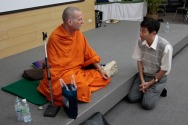David Hawkins, who has a number of books to his name and, if you count people like Eckhart Tolle, Nisargadatta etc .. to be enlightened, then he belongs with that group, has a nice working definition of ‘ego’ as it is usually understood these days. Note that the modern idea of ‘ego’ is always negative, and has changed a lot since Freud popularised the term.
According to Freud’s use of the term, ego is the rational side of the character, that can see that some things you like, might be harmful, and somethings you dislike might be beneficial (as opposed to the id, which only chases what it likes). Ego according to Freud, should be developed. It is a badly functioning ego that is a problem.
Buddhism agrees with Freud. The character (personality or ‘person-pack’) is to be developed, not destroyed in any way. Don’t be confused with the teaching on non-self, which simply means there is no atman that can be found in sense impressions. Or in other words, there is no permanent abiding self or atman that can be found. The character/personality in Buddhism should be developed. In one sutta the Buddha says ‘I see no quality so conducive to realisation as a cultured quality of character’.
Hawkins however, uses ego in the common, modern understanding viz:
“Ego’ as used hereafter generally refers to a collection of thoughts that re presumed to be representative of one’s personal reality and identity, with a shading of implication that the grouping of thoughts and beliefs is purposeful. The purpose is to maintain the illusion of the personal self as the inner’casue’ of one’s existence and activities, including thoughts and feelings. Again, the implication of ‘ego’ is that it is the self-protective collection and structure of the thought processes and is thus blamed as the culprit and source of spiritual error.
An important element of meaning of the term ‘ego’ is the implication that its true basis is pride and narcissism, which bring in guilt about the implied selfishness of the ego.
He continues however, to show the meaning of the word in psychology:
Ego is also a psychological term that generally has an implied survival value. In therapy a patient may have the problem of a ‘weak’ ego and low self-esteem. In contrast ‘egotism’ or ‘egotisitic’ means over inflation or even grandiosity.
In spiritual parlance, ‘ego’ implies a negative quality, an obstacle to realization because of its linear dualistic construction. In psychology, however, the term denotes coping and survival skills needed to deal effectively with the world.
In the spiritual sense above, there is no real equivalent in Buddhism. That is not to say that it differs in any way from Buddhism, just that there is no idea of an ego-created persona that is to be obliterated.



I have never before heard the term “person-pack”. Can you elaborate, please?
This was a Pali Text Society translation … I think of the work ‘Sakkaya’. It can also be thought of as ‘personality’ or mistakenly as ‘self-view’, though there is an argument for the latter. One instance of the word is sakkaya ditthi which means ‘coming from the view of your ego-self’ (not self as in atman/anatta) or ‘false view of individuality’. The reason that the PTS, who were pioneer trnaslators over 100 years ago, used the word ‘pack’ was to emphasise that the ‘person’ is a compound of many different aspects which together we can give a label. Much like a ‘car’ is not actually self existent, but is a collection of many parts. So the ‘self’ as an atman is said to be unfindable in Buddhism, but that does not deny that there is a collection of thoughts, memories and form that makes up a human.